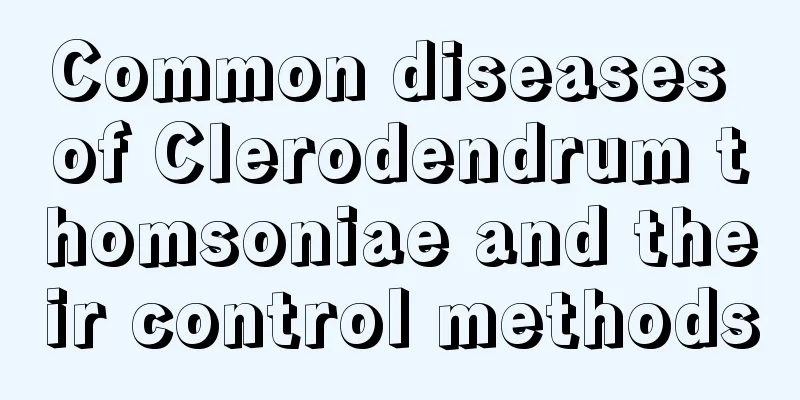Common diseases of Clerodendrum thomsoniae and their control methods

Common diseases of Clerodendrum thomsoniae: leaf spotSymptomsThe Verbenaceae plant belongs to the Verbenaceae family and can develop leaf spot disease, which is caused by infection with Ascomycetes. At first there are just small brown spots. If not treated in time, large black spots will appear, and the leaves will turn yellow and die. Prevention and treatment methodsOnce the disease is discovered, you should immediately spray the leaves with 800 times diluted Benomyl, once every 7-8 days, for 2-3 times in a row, and the plant can be basically cured. Common diseases of Clerodendrum thomsoniae: rustSymptomsRust fungi generally only cause local infection. The affected parts may produce small blisters or blister-like, cup-shaped, or hair-like objects of different colors due to the accumulation of spores. Some may also cause tumors, rough bark, bushy branches, bent branches and other symptoms on the branches and trunks, or cause leaf fall, burnt tips, poor growth, etc. In severe cases, the spores accumulate in dense patches and the plants quickly die due to the evaporation of a large amount of water in the body. Prevention and treatment methods400 times diluted 70% mancozeb wettable powder and 700 times diluted 75% thiophanate-methyl wettable powder can effectively prevent and control rust disease of Ampelopsis thomsoniae. Common diseases of Clerodendrum thomsoniae: mosaic diseaseSymptomsIn the early stage of the disease, chlorotic angular spots appear on the leaves, which eventually turn brown; the diseased leaves show mosaic of light green and evergreen; in severe cases, the leaves become deformed and yellow, the plants become short, the flower spikes are short, the flowers are small and few, or even flower spikes cannot be produced. Prevention and treatment methodsRemove leaves infected by mosaic disease bacteria and then use pesticides for prevention and control. The pesticide can be sprayed with 2500 times diluted 50% benomyl wettable powder for prevention and control. Common diseases of Clerodendrum thomsoniae: Botrytis cinereaSymptomsIt can harm the stems, leaves and flowers of the plant, mainly the flowers. Pathogens invade through weakened host tissues. The leaves are affected, often first at the tip or edge of the leaves. In the early stage of the disease, water-like spots appear on the diseased part, which gradually expand and the diseased tissue turns black-brown and rots. Prevention and treatment methodsRemove diseased flowers and leaves promptly and burn them in a concentrated manner to reduce the source of infection. The greenhouse should be well ventilated, watering should not be excessive, and the indoor temperature and humidity should be controlled. In the early stage of the disease, you can use 800-1000 times diluted 70% thiophanate-methyl wettable powder or 800-1000 times diluted 50% carbendazim wettable powder for spraying for prevention and control. Spray once a week, for 2 to 3 times in a row. |
<<: Common diseases of monkey orchid and their control methods
>>: Common diseases and pests of poppy and their control methods
Recommend
How long does it take for white chrysanthemum to adapt to the pot
White chrysanthemum acclimatization time There is...
Air plants only bloom once in their lifetime
Flowering period of air plants The normal floweri...
Lithops propagation method
1. Sowing period The best time for sowing is in a...
It is better to water the banyan tree every few days.
How often should I water the banyan tree? Banyan ...
How to care for lucky bamboo in winter
Is lucky bamboo afraid of freezing? Lucky bamboo ...
How and when to plant mustard? Which month is best for planting?
Suitable planting time for mustard The planting t...
Common diseases of Aglaonema and their prevention and treatment
Diseases of the Aglaonema schreberi - Chlorosis C...
When is the best season to plant Gastrodia elata?
Gastrodia elata is not only a major medicinal mat...
How to water the umbrella
Watering method The umbrella plant has high requi...
Be careful not to use the wrong pot when growing flowers. Otherwise, the flowers will not survive no matter what you do. No wonder you are a flower killer!
Long flower pots to prevent root rot In our previ...
How to grow the heart-leaf daylily to make it more vigorous
The heart-leafed daylily, also known as the spide...
When does canna bloom?
1. Flowering period The flowering period of canna...
What vegetables are suitable for growing in Shijiazhuang?
What vegetables are suitable for growing in Shiji...
How to prune a juniper bonsai
Juniper bonsai pruning When growing juniper, you ...
How to propagate the worry-free flower
How to propagate the worry-free flower Generally,...









